 W
WPygmy owls are members of the genus Glaucidium. They belong to the typical owl family, Strigidae. The genus consists of about 31 to 35 species distributed worldwide. The exact number of species is somewhat disputed.
 W
WPygmy owls are members of the genus Glaucidium. They belong to the typical owl family, Strigidae. The genus consists of about 31 to 35 species distributed worldwide. The exact number of species is somewhat disputed.
 W
WThe African barred owlet is a species of small owl in the family Strigidae found in much of southern, central and eastern Africa. The taxon may be four species rather than a single species.
 W
WThe Amazonian pygmy owl is an owl found in northern South America and northern Brazil, in the center of the Amazon Basin, and in Venezuela and the Guianas. In the southwest of the basin bordering the Andes cordillera, the species is found in Peru, and Bolivia. In the Guyanas, the range is bifurcated, as the species is not found in the middle country of Suriname.
 W
WThe Andean pygmy owl is a species of owl in the family Strigidae. It is found in Colombia, Ecuador, Peru, and Venezuela.
 W
WThe Asian barred owlet is a species of true owl, resident in northern parts of the Indian Subcontinent and parts of Southeast Asia. It ranges across north central and northeast India, Nepal Bhutan, north Bangladesh, and southeast Asia. Its natural habitat is temperate forest.
 W
WThe austral pygmy owl or Chuncho is a species of owl in the family Strigidae. It is found in Argentina and Chile.
 W
WThe Baja pygmy owl or cape pygmy owl, is a subspecies of northern pygmy owl restricted to the Mexican state of Baja California Sur. Although some taxonomists, including the International Ornithologists' Union, consider it to be a distinct species, other authorities, including the American Ornithological Society, do not consider it separate, and consider it to be a subspecies of the northern pygmy owl.
 W
WThe Central American pygmy owl is a species of owl in the family Strigidae.
 W
WThe chestnut owlet is a species of owl in the family Strigidae. It is found in west and central Africa in two allopatric subspecies that possibly could be classified as separate species.
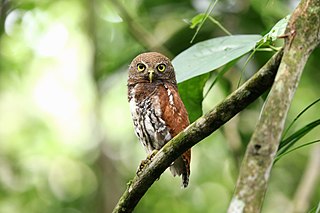 W
WThe chestnut-backed owlet, is an owl which is endemic to Sri Lanka. This species is a part of the larger grouping of owls known as typical owls, Strigidae, which contains most of the smaller owl species. This species was formerly considered to be a subspecies of the jungle owlet.
 W
WThe cloud-forest pygmy owl is a short, muscular, small-sized species of owl found throughout the Andes of western Colombia and north-western Ecuador, being confined to cloud forests between 900–2000 m a.s.l. Below this altitudinal range the Central American pygmy owl occurs; above it, the Andean pygmy owl occurs.
 W
WThe Colima pygmy owl is a species of owl in the family Strigidae.It is endemic to the western part of Mexico. Its habitat consists of tropical deciduous and tropical lowland evergreen forests. The Colima pygmy-owl is very small, have a spotted rounded head and long tails. It has a pair of prominent black marks on its nape to protect itself. This species preys on large arthropods and very small vertebrates. They are distinguished by their song which has 24 notes, the first one being the longest and is a hollow hooting sound.
 W
WThe collared owlet, also known as the collared pygmy owl, is a species of owl in the family Strigidae. Its natural habitat is submontane and montane forests with open spaces and is distributed throughout oriental Asia. It is the smallest owl in Asia, at 15 cm (5.9 in) and 60 g (2.1 oz).
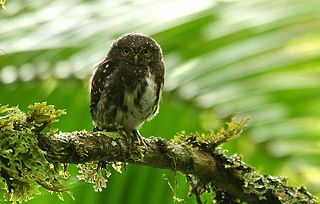 W
WThe Costa Rican pygmy owl is a species of owl in the family Strigidae found in the Talamancan montane forests of Costa Rica and western Panama.
 W
WThe Cuban pygmy owl is a species of owl in the family Strigidae that is endemic to Cuba. Its natural habitats are dry forests, moist forests and heavily degraded former forest.
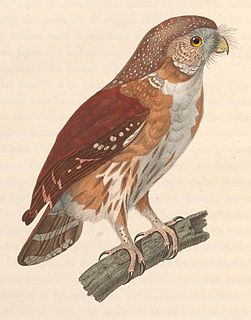 W
WThe East Brazilian pygmy owl, also known as least pygmy-owl or Sick's pygmy-owl, is a small owl in the typical owl family.
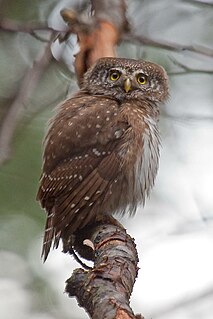 W
WThe Eurasian pygmy owl is the smallest owl in Europe. It is a dark reddish to greyish-brown, with spotted sides and half of a white ring around the back of the neck. This species is found in the boreal forests of Northern and Central Europe to Siberia.
 W
WThe ferruginous pygmy owl is a small owl that breeds in south-central Arizona and southern Texas in the United States, south through Mexico and Central America, to South America into Bolivia, Paraguay and Argentina.
 W
WThe Guatemalan pygmy owl is a bird of the family Strigidae. It is considered a distinct species by some authorities, including the International Ornithologists' Union. Others, including the American Ornithological Society, consider it to be a subspecies of northern pygmy owl.
 W
WThe Javan owlet is a species of owl in the family Strigidae. It is native to the islands of Java and Bali.
 W
WThe jungle owlet, or barred jungle owlet, is found in the Indian Subcontinent. The species is often found singly, in pairs or small groups and are usually detected by their calls at dawn and dusk. There are two subspecies with the form found in the Western Ghats sometimes considered a full species.
 W
WGlaucidium kurochkini is an extinct species of pygmy owls that existed in what is now California, U.S.A. during the late Pleistocene epoch.
 W
WThe mountain pygmy owl is a small owl from Central America. It is considered a distinct species by some authorities, including the International Ornithologists' Union. Others, including the American Ornithological Society, consider to be a subspecies of northern pygmy owl. If considered conspecific, the scientific name G. gnoma is usurped by the northern pygmy owl. The Northern Mountain Pygmy Owls’ habitats range from coniferous forests to deciduous bottomlands, and despite its large geographic distribution, “it is one of the least studied owls on the continent”. Its diet consists of small birds and mammals, and it has a reputation of being a fierce hunter. This species of owl will nest in natural cavities and in ones created by woodpeckers. In a study conducting research on Northern Mountain Pygmy Owls preferred habitats in the Rocky Mountains, it was discovered to prefer large diverse forests with trees near a stream because it offered protection from predators and camouflage for ambush attacks.
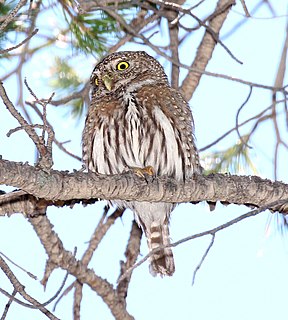 W
WThe northern pygmy owl is a small owl native to western North America.
 W
WThe Pacific pygmy owl or Peruvian pygmy owl is a dirunal species of owl in the family Strigidae. It is found in Ecuador and Peru year round and its natural habitats are subtropical or tropical dry shrubland, subtropical or tropical moist shrubland, subtropical or tropical high-altitude shrubland, and heavily degraded former forest.
 W
WThe pearl-spotted owlet is an owl that breeds in Sub-Saharan Africa. This species is a part of the larger grouping of owls known as typical owls, Strigidae, which contains most species of owl. The other grouping is the barn owls, Tytonidae.
 W
WThe red-chested owlet is a species of owl in the family Strigidae, native to the African tropical rainforest. Its habits and behaviour are poorly known.
 W
WThe Tamaulipas pygmy owl is a species of owl in the family Strigidae. It is endemic to Mexico. This is one of the smallest owls in the world at a mean length of 13.5 centimetres (5.3 in). However, at 53 grams (1.9 oz), it is slightly heavier than the long-whiskered owlet and the elf owl. Its natural habitat is subtropical or tropical moist montane forests.
 W
WThe Yungas pygmy owl, is a species of owl in the family Strigidae. It is found in Bolivia, Peru, and possibly in Argentina. Its natural habitat is subtropical or tropical moist montane forest.